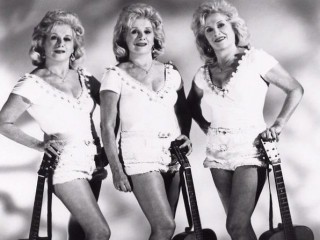
Del Rubio Triplets biography
Date of birth : -
Date of death : -
Birthplace : California, U.S.
Nationality : American
Category : Arts and Entertainment
Last modified : 2012-04-26
Credited as : Music group, 3 Gals, 3 Guitars album, Del Rubio Records label
3 votes so far
The Del Rubio Triplets, Eadie, Milly, and Elena Boyd were born in the Panama Canal Zone during the 1920s. Although their exact age remained a professional secret, it was known that Milly was born first. Elena followed Milly 15 minutes later, while Eadie was born 15 minutes after Elena. Eadie related the story behind why she, Elena, and Milly were born as triplets to Lacher, "Daddy always liked to buy two extra of everything. So when the nurse told Mama she had triplets, she said, 'That figures'."
The Del Rubio Triplets were reared and spent their childhood in both Washington DC and the Panama Canal Zone. At the age of 14, the Del Rubio Triplets visited Los Angeles for the first time with their parents. The reason for the trip was because their father was tired of hearing them talk incessantly about movie stars and he was under the assumption that the "field trip" might, for once and for all, put the silly Hollywood fantasy notion out of their heads.
Not only did their father's plan backfire--seeing the stars out and about in Beverly Hills only further stoked the fires of glamour and fame in the Del Rubio Triplets' minds--the trip started the transformation of the triplets from the Boyd sisters to the more upscale and classy Del Rubio Triplets.
Shortly after they left high school, the Del Rubio Triplets started to bleach their hair. They had remembered the "effect" blondes had on their father. Commenting on this to Lacher, Elena said, "Daddy brainwashed us with blond hair. He married a brunette, but I'm telling you he was insane over blond hair. He never told us anything about blondes being so wonderful. It was just us watching him put the brakes on to watch the blonde cross the street." Around this time they started performing as dancers, although as Milly told Steve Daugherty from People, "Even though we didn't have any talent, we knew we wanted to be in show business."
When they moved to Hollywood, the Del Rubio Triplets started to teach themselves how to sing in order to work the club circuit. On their semi-official website Milly commented, "We had no coach. We learned by listening to records of our favorite singers." They accompanied themselves on guitar as well--three identical Martin guitars that their father had bought for them when they first started out.
The word "rubio"--which means blond in Spanish--gave them the root of their stage name as Elena explained to Lacher, "Almost all the Latin people would meet us backstage and call us the rubias. And it sounded so pretty. So I said that would be a name for us." Eadie picked up the story; "We put the Del in front because Del Rubio is so much prettier than just Rubio. It's more musical."
For the Del Rubio Triplets the late 1950s and early 1960s were spent cruising the local lounge circuit as they honed their craft and as that started to wane they embarked on a self financed three year world tour during which they established themselves as "song stylists." It was their mother's stroke in 1965 that brought the Del Rubio Triplets back to America, or more specifically, the hospital where their mother was recovering. Eadie told Daugherty, "We sang to her in the hospital. . . . Mom's dying words were 'Don't let anybody persuade you to get out of this business'."
After their mother died, the Del Rubio Triplets went into seclusion and lived off of a small inheritance for five years before they decided to hit the road. The Del Rubio Triplets remembered the power of song when they sang to their mother in the hospital and they wanted to share a little of this joy with others. So they embarked on a tour of retirement homes and hospitals where they played for and entertained the residents, retirees and the sick.
In 1987, the Del Rubio Triplets finally made it to the big time when they were asked to perform at a party for members of Los Angeles's underground art scene and made appearances on such television programs as Pee Wee's Playhouse, Night Court, Golden Girls, Ellen, Full House, Married with Children, and MTV.
The following year the Del Rubio Triplets released their first album, 3 Gals, 3 Guitars, which featured covers of such classic and contemporary rock hits as the Doors' "Light My Fire," the Pointer Sister's "Neutron Dance," the Beatles' "Hey Jude," and the Bangles' "Walk Like an Egyptian."
Three years later the Del Rubio Triplets released Whip It. The 1991 release featured uniquely Del Rubio interpretations of the songs "Whip It" by Devo, the Rolling Stones' "Satisfaction," and "Wake up Little Suzy" by the Everly Brothers. While both of the Del Rubio Triplets' cover albums were released on the label Karma, their holiday songfest retrospective, Jingle Belles, was released on their own Del Rubio Records label in 1991.
None of the Del Rubio Triplets ever married because, as Eadie told Lacher, "God comes first.... my sisters come second.... Music comes third" and any potential love interest was a distant "fourth."


















